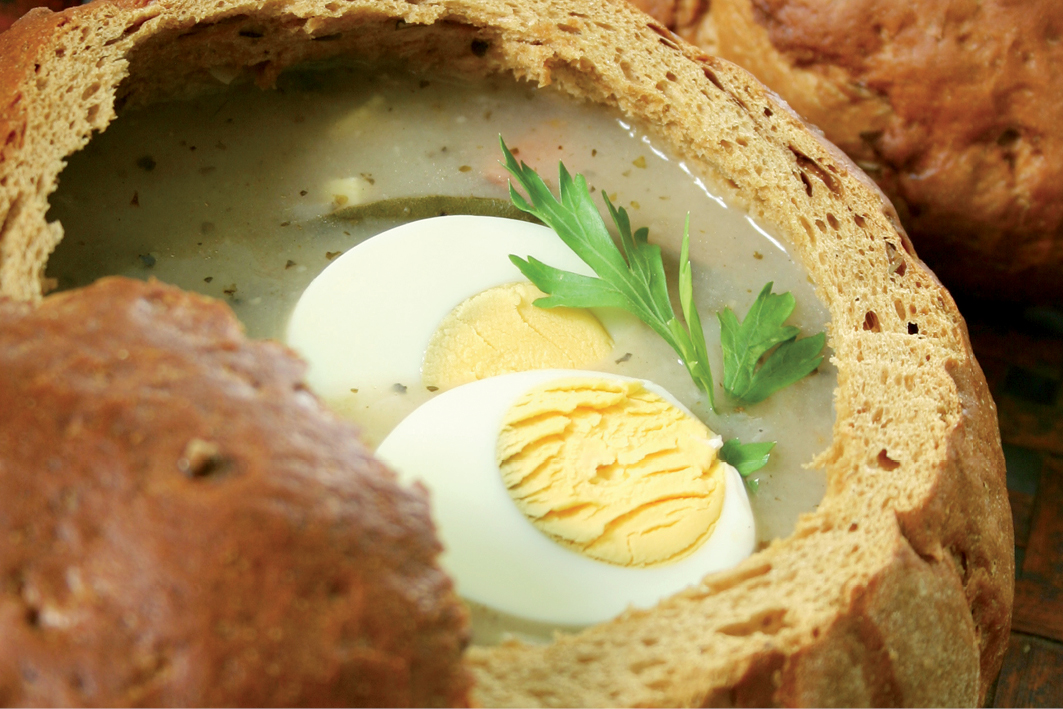Polish products are well-known, appreciated, their quality and taste praised by many international consumers. Polish producers count on, not only quality, but also on intense promotional and trade activities, thus present at all major international food fairs. Polish stands tempt with their rich offer, and more importantly – an exceptionally tasty offer.
Year by year, the image of Polish food keeps improving, and the quality systems implemented guarantee the highest standards. The fact that the quality of what Polish firms have to offer is accepted, both in the EU market and the rest of the continent, best explains the fact that Polish products are currently in the remotest corners of the world and from the perspective of the Polish market, in exotic locations. And are constantly being expanded with new ones.
Polish producers are well aware, that the quality of food products are playing a bigger role and are becoming the deciding factor for consumers when shopping. That is why they are constantly striving to improve the quality of the offered assortment. A great benefit is the combination of experience with old Polish recipes and tradition with modernity. Modernity helps in keeping an eye on the quality of the products at each step of production – from the raw material to the finished goods, tradition is the response to the trend manifested by the fashion for traditional products, old Polish. In response to this trend the National List of Traditional Products was created. Thanks to this list, it is easier to promote and pass on information internationally about the Polish products made using traditional and historically-established methods. The list was created on 17 December 2004, and the first product placed on the list (in July 2005) was pierekaczewnik - pierogi from the Podlasie region, which is a speciality for those living in the Tartar region. Currently, there are 1300 products on the list. It is worth noting that the names of the products and not the producers are on the list. The attractiveness of traditional and regional products depend on, inter alia, the connection with the given area – with unique climatic qualities, breeding methods, traditional production recipes, passed down from generation to generation. The newest products entered into the list (August 2014) are: red currant jelly (jelly with świętojonki), baking powder and yeast buns with icing (drożdżówka).
The production, protection and promotion of high quality food plays an increasingly important role in the European Union. One of the basic ways of implementing the quality policy is by using distinguishing symbols, which confirm the high quality of agri-food products originating from specific regions, as well as those characterized by the traditional method of production.
The protection and promotion of regional and traditional products is one of the most important factors affecting the sustainable development of rural areas and achieving the objectives of the second pillar of the Common Agricultural Policy. Due to the large variety of products placed on the market, consumers want clear and comprehensive information on the quality and origin of the agricultural product or foodstuff. The identification and selection of individual products facilitate geographical indications, designations of origin and guaranteed traditional specialities.
Consumers are becoming more educated, about which products they want to reach for, they read the labels, analyse the composition. From year to year their awareness and knowledge on quality systems is increasing, and are not only incomprehensible and mysterious additions to the product.
One of the Polish systems in distinguishing our products is the 'Discover Great Food Programme' (DGF), which is a tool of the Ministry of Agriculture and Rural Development, aiming to promote food products of the highest quality. The symbol DGF is given only to the products, which meet the precise criteria prepared by scientific experts, who include renowned experts in the field of: nutrition, crop cultivation, animal husbandry, health, and law.
The system "Quality Tradition", developed by the Polish Chamber of Regional and Local Products in Warsaw is the national food quality scheme, which distinguishes quality food, taking into account traditional products. The products, before being allowed to participate in the program, are subjected to verification in accordance with the Rules of Symbol, accepted by the Patent Office, and previously approved by the Board of the Polish Chamber of Regional and Local Products and the Association of Polish Regions.
An extremely important – and rapidly growing - branch of the food industry is organic farming. Here, many Polish producers can be proud of their produce, wholly natural, with no synthetic fertilizers, chemical pesticides, or modified forages used. The production plants are located in ecologically clean areas, uncontaminated by industrial waste and what is important - are environmentally friendly. Only from such farms, with appropriate quality certificates, can certified organic products be derived from, granted for a period of a year by accredited certification bodies.
The list of Polish producers, who can be proud of excellent production quality and a lengthy tradition of production is quite long, it would be difficult to name them all, or even just the most important. But, it is definitely worth cooperating with all Polish manufacturers present at the fair!
An example of a company that cares about traditional production is the Octim Company, in business since 1994, and specialising in the production of high quality vinegar, mustard and ketchup, prepared exclusively from natural raw materials. Distilled vinegar is obtained by means of traditional methods, biological fermentation of spirits, and also obtained by the fermentation of cider apples originating from Poland. For the production of mustard the company uses only selected mustard seeds, which must meet the specified quality conditions.
Polish proven recipes are being used in production at the Meat Company, Łmeat-Łuków, operating since 1973. They combine tradition with modernity, systematically modernizing their processing plants and offering products that meet world standards and at the same time, have a typically traditional assortment with proven recipes.
The Dairy Cooperative Spomlek from Radzyń Podlaski, can boast about their great success in sales, they exported almost a quarter of their produce and at the same time are one of the main pillars of Polish dairy exports to Russia. This is owed to the excellent technology and the highest quality milk from reliable suppliers. And of course, the tradition - the beginning of the Dairy Co-operative Spomlek dates back to the first half of the twentieth century.
Pearl - Lublin Breweries can boast of an even longer history, dating back to 1844. Pearl - Lublin Breweries is regional beer producer, whose golden liquor is brewed according to traditional recipes, using modern technological lines. The exceptional taste of their beer is appreciated, not only by consumers from the European Union, but also in countries like: Australia, Paraguay, Zambia, Ghana, Cameroon, Benin, United States.
Export to over 20 countries in four continents, is an achievement of the Confectionery Production Plant Vobro, established in 1986. They produce about 100 types of chocolate products and 30 types of cakes. Approximately, 10 million of their sweets reach the world market, annually.
Modern technology and the preservation of tradition and timeless recipes is the key to success in the Meat Plant Pekpol Ostroleka, which has been in business for over 40 years. Most of the 120 product items, are based on proven and unchanging recipes. Of course, in the plant they keep introducing new technologies, adapted to the requirements of the European Union. Thanks to which, Pekpol is one of the most significant producers of sausages in Poland.
In contrast, one of the leading Polish producer of jams, preserves, marmalades and Powidła (unsweetened plum jam), established in 1979 is the company Stovit. Through innovation, years of experience, as well as having a recognized brand, the company supplies major retail chains in Europe, and also has a prominent place on the market as producer of private labels for retailers.
The Sweet Company 'Pszczółka' (meaning Bee) has for over 60 years produced hard and filled candy, based on their proven, unique recipes, combining tradition with the changing taste and preferences of customers. Thanks to which, consumers not only in the country but all over the world can enjoy excellent products combining tradition with modernity.
Excellent quality, traditional recipes and modern technological lines - are definitely the strengths of Polish food products. These values are appreciated by consumers around the world, because Polish manufacturers are present on the tables in the remotest corners of the world, with products known for years, and with the new ones too.
Maja Święcka












